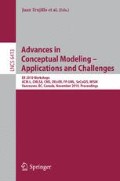Abstract
This paper addresses a fundamental problem existing in the development of digitalising scientific contribution for individuals – the author identification problem. Instead of proposing an accurate and complete approach to identify authors in an open-world domain, which seems to be hardly found, we aim to develop the knowledge-based identification for authors by establishing an identity layer between a conceptual layer and a view layer. With the evolving knowledge acquired from different communities, a visual model built upon the conceptual and identity layers is adaptive such that the degree of accuracy and completeness on author identification can be improved over time.
Access this chapter
Tax calculation will be finalised at checkout
Purchases are for personal use only
Preview
Unable to display preview. Download preview PDF.
References
Credit where credit is due. Nature 462(7275), 825 (December 2009)
Aho, A.V., Ullman, J.D.: Universality of data retrieval languages. In: Proceedings of Principles of programming languages, pp. 110–119. ACM Press, New York (1979)
Bennett, R., Hengel, C., Hickey, T., O’Neill, E., Tillett, B.: Virtual international authority file. In: ALA Annual Conference, New Orleans (2006)
Börger, E., Stärk, R.F.: Abstract State Machines: A Method for High-Level System Design and Analysis. Springer, Heidelberg (2003)
Bourdon, F., Webb, R.: International cooperation in the field of authority data: an analytical study with recommendations. KG Saur (1993)
Habibzadeh, F., Yadollahie, M.: The problem of who. International Information and Library Review 41(2), 61–62 (2009)
Hartmann, S., Link, S.: Collection type constructors in entity-relationship modeling. In: Parent, C., Schewe, K.-D., Storey, V.C., Thalheim, B. (eds.) ER 2007. LNCS, vol. 4801, pp. 307–322. Springer, Heidelberg (2007)
Hull, R., Yap, C.K.: The format model: a theory of database organization. In: Proceedings of Principles of database systems, pp. 205–211. ACM Press, New York (1982)
Swan, A.: Author identification web page, http://repinf.pbworks.com/Author-identification
Thalheim, B.: Entity-Relationship Modeling: Foundations of Database Technology. Springer, Heidelberg (2000)
Author information
Authors and Affiliations
Editor information
Editors and Affiliations
Rights and permissions
Copyright information
© 2010 Springer-Verlag Berlin Heidelberg
About this paper
Cite this paper
Wang, Q., Noack, R. (2010). Intelligent Author Identification. In: Trujillo, J., et al. Advances in Conceptual Modeling – Applications and Challenges. ER 2010. Lecture Notes in Computer Science, vol 6413. Springer, Berlin, Heidelberg. https://doi.org/10.1007/978-3-642-16385-2_13
Download citation
DOI: https://doi.org/10.1007/978-3-642-16385-2_13
Publisher Name: Springer, Berlin, Heidelberg
Print ISBN: 978-3-642-16384-5
Online ISBN: 978-3-642-16385-2
eBook Packages: Computer ScienceComputer Science (R0)

